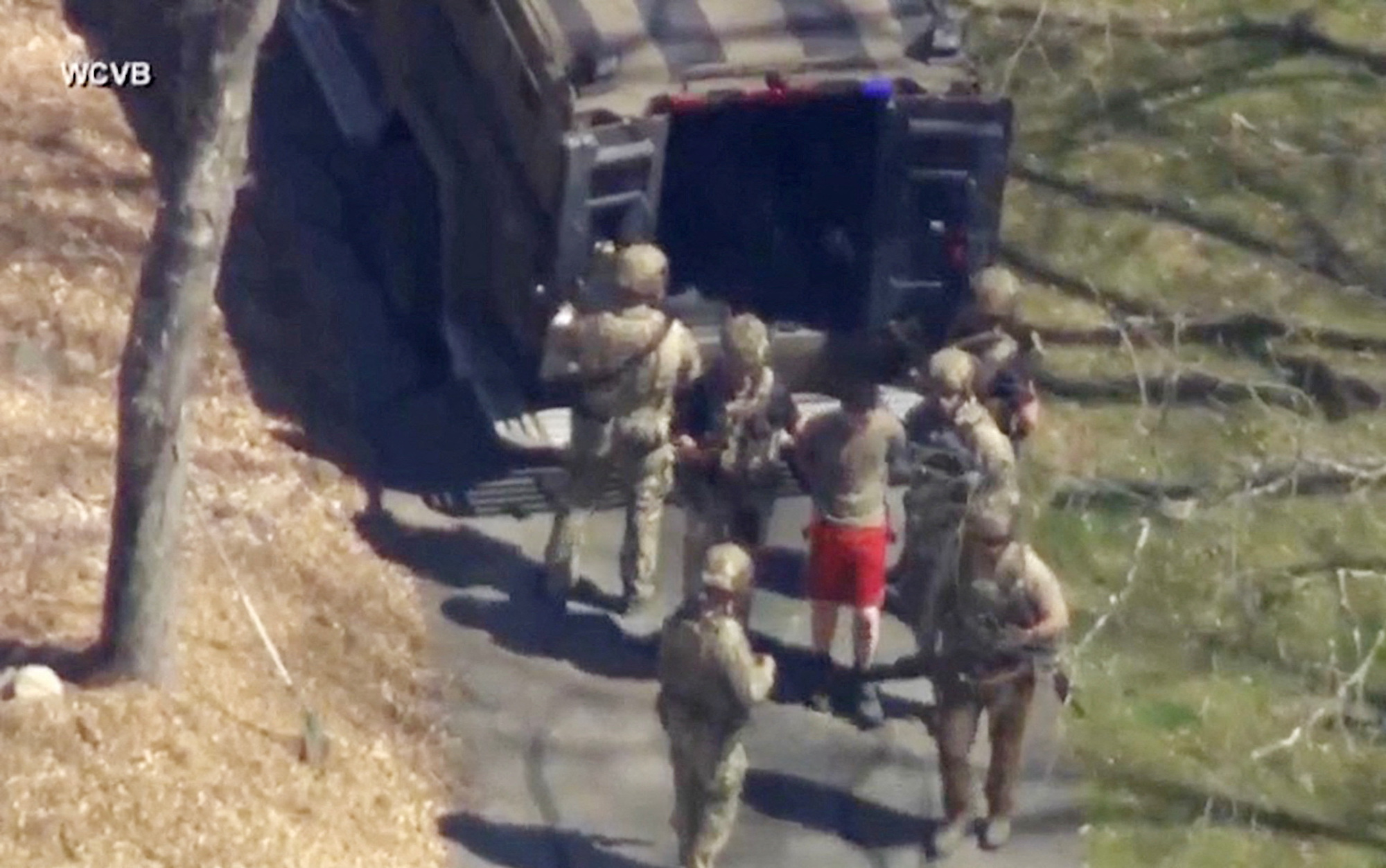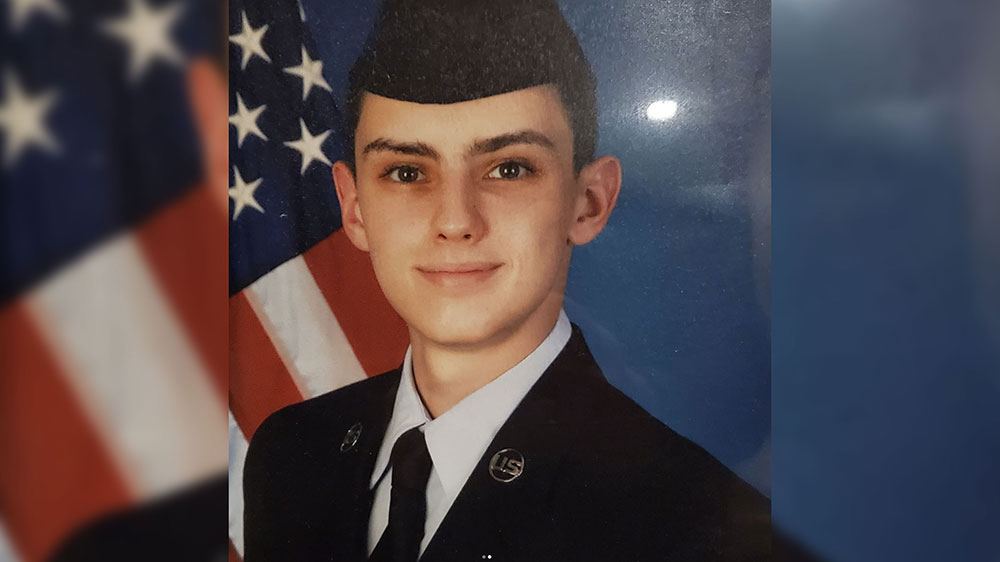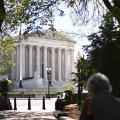Our live coverage of the US classified documents leak has moved here.
April 13, 2023 - Arrest made in connection with leaked US classified documents
By Elise Hammond, Adrienne Vogt, Matt Meyer and Maureen Chowdhury, CNN
Our live coverage has moved
How was an entry-level Guardsman allegedly able to access classified docs? CNN's intelligence expert explains
From CNN staff
How was a 21-year-old allegedly able to access classified documents that included detailed intelligence assessments of allies and adversaries alike, including on the state of the war in Ukraine?
John Miller, CNN's Chief Law Enforcement and Intelligence Analyst, discussed the background to the investigation that led to the arrest of a suspect Thursday in Massachusetts.
How could a 21-year-old with an entry-level rank in the Air National Guard allegedly have access to this kind of material?
John Miller: You have to understand how much we rely on young people with sensitive jobs in the military.
Jack Teixeira worked in the 102nd Intelligence Wing of the Air National Guard. Their job is very sensitive and vital. They fly the drones that conduct Intelligence/Surveillance/Reconnaissance or “ISR” missions in support of the Air Force and warfighters on the ground in places like Iraq, Afghanistan, Syria, and in support of special operations teams who may be sent anywhere on classified missions. That means that units need access to a broad amount of intelligence collection and analysis because they may be operating in multiple theaters against multiple threats. Their other mission is cyber intelligence collection and that is even broader in terms of scope.
Here is a simple reality: Most enlisted people are young and they are there to do the mission and to learn and advance and almost all of them are trustworthy to an oath they take. But we still recruit from the human race. We are going to see the Edward Snowdens and the Chelsea Mannings, the Reality Winners and the soldiers and contractors who betray that oath and we see them caught and — except for Snowden who fled — we see them pay with significant prison terms.
Some have criticized the FBI because reporters seemed to solve the case faster than the bureau did.
Miller: The FBI certainly did not like being in a race with reporters. Reporters did what reporters can do. We exploit the information that is out there in open-source channels like the internet. This is a case where the trail starts there. At the same time, the FBI had a witness who agreed after talking to a lawyer to cooperate, The Washington Post found another young man who would talk to them, but not the FBI. I’ve been on both sides of these things before. No one in the FBI is happy about how this went because so much could have gone badly, but it ended safely.
Why today's arrest wasn't the FBI's preferred plan. A Q&A with CNN's intelligence analyst
From CNN's staff

Jack Teixeira, 21, a member of the Massachusetts Air National Guard, was arrested by the FBI on Thursday in connection with the leaking of classified documents that have been posted online.
John Miller, CNN's Chief Law Enforcement and Intelligence Analyst, discussed the circumstances surrounding the investigation and the dramatic arrest outside a residence in Massachusetts.
How did the arrest on Thursday happen?
John Miller: What you saw was a very intensive investigation that has been going on since the day the Department of Defense referred this case to the Justice Department and the FBI.
When the FBI made the call to move in today, it was not their preferred plan.
They have been closing in on Teixeira for a few days. The investigation is only five days old. His father’s home and his mom’s residence were both under surveillance today while agents worked with prosecutors to ensure the evidence they had was enough for prosecutors to approve they had probable cause to make an arrest. What they wanted to do was arrest him when he went to work at the military base where he was assigned. That would have been a controlled environment. But he didn’t go to work today.
Why didn't they want to arrest him at home?
Miller: His social media posts indicated he owned a significant number of weapons including military-style assault weapons and, of course, he has received military training in those weapons. It’s also pretty clear from stories appearing in The New York Times and The Washington Post that Jack Teixeira knew it was a matter of time before he was identified and arrested. Not knowing his mental state, going up against a trained military person in a house with weapons was not an ideal scenario. The surveillance teams were literally watching New York Times reporters showing up at the door of the house. The suspect’s name was in the Times and that was out on social media — so the FBI made the decision to move in.
What will the FBI be looking for in the house?
Miller: They are going to want any computers, phones, hard drives, thumb drives, discs, gaming systems, printers, basically anything that could store data. They are going to look for notes, writings, papers, and documents. They are going to look for other things — the hunting magazine or the nail clippers, those things that were seen on the bed where it appears the pictures of documents were taken. If the bedspread matches the one that was in the background of some of the pictures of documents, they’ll take that too.
So how was the suspect caught?
Miller: You had two fields of investigation here. One was on social media. How could you trace these documents back from Twitter to Discord to a private chatroom with a limited number of participants? That means serving Discord with orders to preserve these records so users can't delete them. That means getting subpoenas and search warrants for the contents of that chatroom. That takes some time because you have to show probable cause. The FBI was able to convince a reluctant witness who was a member of the chat group to cooperate and that helped move this process forward
The Washington Post was able to exploit that end of the case and talk to a member of the chat group who wouldn’t name the leader who posted the documents. The New York Times published his name before he was arrested, but that’s reporting, not evidence.
The DOD, FBI and OSI, the Air Force Office of Special Investigations explored those same paths, but they also did things reporters and online gamers and sleuths couldn’t do — they pulled logs. Who looked at those documents? Who, in a classified setting, read those reports and then sent them to a classified printer that logs every document it prints with a time stamp and the computer that sent the request. The computer records the chip of the ID card and the login of the user that pulled up the document to print it. They quickly narrowed a large number of possibilities to a very small number and zeroed in on this 21-year-old airman over the last 48 hours. One of the complicating factors was, reporters did too.
Pentagon warns service members not to access sensitive documents from unclassified websites
From CNN's Oren Liebermann
The Pentagon warned service members not to access sensitive documents from unclassified websites, underscoring the seriousness of handling classified documents.
The memo, from Deputy Defense Secretary Kathleen Hicks, is intended as a reminder about the policies and procedures around the handling of classified documents, cautioning service members “not to discuss classified information with any person not authorized to receive such information.”
It also warns service members not to download documents with classified markings from unclassified websites, since they may be associated with foreign adversaries or contain malicious code that could pose a cyber threat to defense department information systems.
The memo was sent a day before the arrest of 21-year-old Jack Teixeira, a member of the Massachusetts Air National Guard, in connection with the leaking of classified documents.
The memo does not refer to a service member, instead only referencing “recent reporting on the unauthorized disclosure of what appear to be classified DoD and Intelligence Community documents.”
The memo also warns service members not to speak to the media or to Congressional members or staff about classified documents, directing them to public affairs or to the Office of Legislative Affairs, respectively.
Teixeira was a loner and fascinated by war and weapons, former classmates say
From CNN's Blake Ellis, Scott Glover, Jeff Winter, Melanie Hicken
The 21-year-old Massachusetts man arrested by the FBI Thursday in connection with the leaking of a trove of classified US government documents had a fascination with the military, guns and war, several former high school classmates told CNN.
Jack Teixeira would sometimes wear camouflage to school, carried a “dictionary-sized book on guns” and behaved in a way that made some students uneasy.
“A lot of people were wary of him,” said Brooke Cleathero, who attended middle school and high school with Teixeira. “He was more of a loner, and having a fascination with war and guns made him off-putting to a lot of people.”
John Powell, who also attended middle school and high school with Teixeira, said he recalled him as a pleasant and quiet kid who was sometimes picked on. “He didn’t have many friends,” Powell said.
Teixeira grew up in the suburbs of Providence, Rhode Island, according to public records. He attended Dighton-Rehoboth High School in Massachusetts where he graduated in 2020, according to the superintendent of the regional school district.
Powell recalled Teixeira occasionally toting around a textbook on military vehicles — tanks, planes and submarines — and having a fascination with anything “military-related” from an early age.
“He was dead set on joining some branch of the military, even as a kid,” Powell said.
Other students, who asked not to be identified, said they detected a more menacing vibe from Texeira, who some recalled making comments they perceived as racist or mumbling derogatory things about people under his breath.
One student recalled him showing up for school wearing a shirt with an AR-15 on it the day after the mass shooting in Las Vegas in 2017.
Teixeira didn’t behave in a manner that rose to the level where “people felt the need to report him,” another former classmate said, but “he made me nervous.”
The same student said she took his fascination with the military as a form of American nationalism and was therefore surprised by the allegations against him.
“I didn’t think he would be capable of doing something like this,” she said.
Teixeira, a member of the Massachusetts Air National Guard, is expected to make his initial appearance in US District Court in Boston on Friday.
Former AG Barr on classified documents: "It's too easy to get access to this stuff"
From CNN's Jack Forrest
The alleged leak of classified documents by a 21-year-old Air National Guardsman points to an endemic problem in Washington's security apparatus, said former Attorney General William Barr on Thursday.
Speaking with CNN's Kaitlan Collins, Barr said the leak was "stunning, and it points to a problem that's endemic in our national security structure in Washington, DC."
"It's partly just the dissemination of information within agencies. The idea that there's really a good reason to spread this thing out – 'everyone will do a better job if they're fully aware' – and so it's too easy to get access to this stuff."
Barr noted that technology is playing a role in placing too many eyes on sensitive documents. "But hopefully this will be a wake-up call," he added.
Analysis: Arrest of classified documents leak suspect spotlights vulnerabilities in US intelligence
Analysis from CNN's Josh Campbell
US Attorney General Merrick Garland announced Thursday that 21-year-old Massachusetts Air National Guardsman Jack Teixeira was taken into custody by federal agents and accused of “alleged unauthorized removal, retention and transmission of classified national defense information.”
While there is currently no indication that Teixeira allegedly leaked classified documents at the behest or under the control of a foreign power, investigations into major American spy cases involving suspects with varying motivations have uncovered serious inadequacies in the government’s ability to guard itself against penetration.
In the case of convicted CIA spy Aldrich Ames, congressional investigators slammed the agency for its ability to deal with Ames’ suitability problems, including “drunkenness, disregard for security regulations, and sloppiness towards administrative requirements.”
After Robert Hanssen’s treachery was exposed, investigators learned he had full access to the FBI and State Department’s computer systems and would spend hours trawling undetected for classified information. In his 25 years with the bureau, with access to highly sensitive sources and methods about US intelligence efforts targeting the Soviet Union and Russia, Hanssen had never been subjected to a polygraph examination.
After the Ames and Hanssen cases, the CIA and FBI moved to strengthen its so-called insider threat programs aimed at safeguarding the nation’s secrets by closely scrutinizing the finances and travel of personnel with access to classified information and increasing the use of polygraphs to routinely assess employees for continued allegiance and suitability.
While intelligence agencies like the FBI and CIA have increased precautions, the Defense Department, which employs the bulk of America’s intelligence community employees, remains extremely vulnerable, and will almost certainly be taken to task by oversight investigators following the latest disclosures.
Although much is still not publicly known about Teixeira’s level of clearance and his US government background investigation, one major issue for the Defense Department pertains to how often and robustly counterintelligence officials scrutinize employees with access to information on an ongoing basis.
Following leaks, defense secretary orders review of intelligence access and control procedures
From CNN's Haley Britzky
Defense Secretary Lloyd Austin is directing a review of intelligence access following the arrest of an Air National Guardsman who allegedly leaked classified intelligence online.
The review will be conducted by the Under Secretary of Defense for Intelligence and Security, Austin said. It will also examine "accountability and control procedures within the Department to inform our efforts to prevent this kind of incident from happening again.”
“As Secretary of Defense, I will also not hesitate to take any additional measures necessary to safeguard our nation’s secrets,” Austin said in a statement Thursday.
This review is part of the broader internal probe the Defense Department is conducting of its practices and the potential damage caused by the leak, which CNN has previously reported is being led by Milancy Harris, the deputy under secretary of defense for intelligence and security.
The leaked documents posted to social media included detailed intelligence assessments of allies and adversaries alike, including on the state of the war in Ukraine and the challenges Kyiv and Moscow face as the war appears stuck in a stalemate.
Austin commended the Department of Justice and FBI for their arrest of Jack Teixeira, a 21-year-old Guardsman assigned to the Massachusetts Air National Guard. Teixeira allegedly leaked classified intelligence onto a Discord server in recent months.
“The Department of Defense, in close partnership with the Intelligence Community and our interagency partners, will continue to review the national security implications of this unauthorized disclosure,” Austin said.
A 21-year-old Air Force guardsman was arrested in connection to leaked documents. Here's what we know
From CNN staff

Jack Teixeira, a member of the Massachusetts Air National Guard, was arrested in Massachusetts on Thursday in connection to a leak online of classified US intelligence.
The leaked documents appeared last month on the social media platform Discord, according to screenshots of the posts reviewed by CNN. Teixeira, 21, is believed to be the leader of a Discord chat group where the documents were posted, multiple US officials told CNN.
The documents included detailed intelligence assessments of allies and adversaries alike, including the state of the war in Ukraine.
The Pentagon has begun to limit who across the government receives its highly classified daily intelligence briefs following the leak.
The arrest: The suspect was under surveillance for at least a couple of days prior to his arrest, according to a US government source familiar with the case. He was expected to go to work Thursday where the FBI intended to take him into custody under more controlled circumstances, according to the source.
When the suspect did not go to work, agents who were already positioned outside his mother’s house, waited for the suspect to come out, the source said. This search and arrest effort accelerated when reporters for The New York Times knocked on the house door and spoke to people inside.
Here's what else we know about the suspect:
- Teixeira grew up in the suburbs of Providence, Rhode Island, according to public records. He attended Dighton-Rehoboth High School where he graduated in 2020, the superintendent of the regional school district said.
- He entered the Air National Guard on Sept 26, 2019, according to the Defense Department.
- His official job is Cyber Transport Systems journeyman. According to the Air Force, Cyber Transport Systems specialists are tasked with making sure the service’s "vast, global communications network" is operating correctly.
- He was recently promoted to the rank of Airman 1st Class, which is the third enlisted rank an airman will make. According to his record, Teixeira had earned one Air Force Achievement Medal, which is a relatively standard medal for airmen of that age and rank to receive.
- Attorney General Merrick Garland said Teixeira was arrested in connection with the alleged unauthorized removal, retention and transmission of classified national defense information.
- Teixeira will first appear in court on Friday in Boston, according to the US attorney’s office there.



